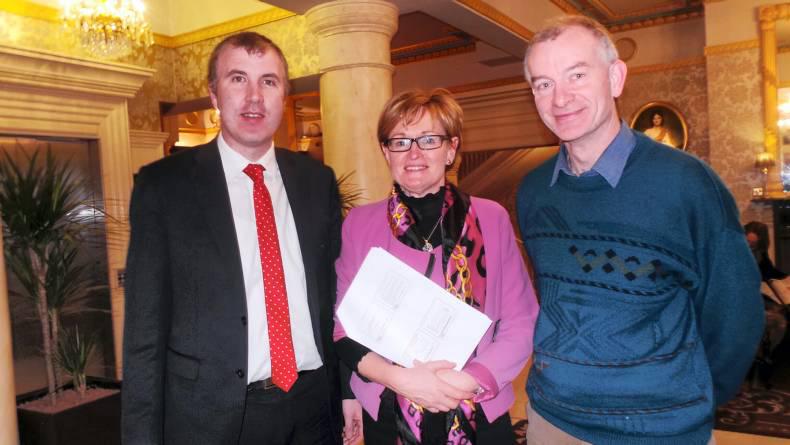
LOYALTY CODE:
The paper code cannot be redeemed when browsing in private/incognito mode. Please go to a normal browser window and enter the code there

LOYALTY CODE:
The paper code cannot be redeemed when browsing in private/incognito mode. Please go to a normal browser window and enter the code there
This content is copyright protected!
However, if you would like to share the information in this article, you may use the headline, summary and link below:
Title: McGuinness calls for fair emissions targets for ammonia
Ireland has a target of a 5% reduction of ammonia by 2030, which Teagasc has calculated would cost €36m per year.
https://www.farmersjournal.ie/mcguinness-calls-for-fair-emissions-targets-for-ammonia-199315

ENTER YOUR LOYALTY CODE:
The reader loyalty code gives you full access to the site from when you enter it until the following Wednesday at 9pm. Find your unique code on the back page of Irish Country Living every week.

CODE ACCEPTED

You have full access to farmersjournal.ie on this browser until 9pm next Wednesday. Thank you for buying the paper and using the code.

CODE NOT VALID
Please try again or contact us.
For assistance, call 01 4199525
or email subs@farmersjournal.ie
Sign in

Incorrect details
Please try again or reset password
If would like to speak to a member of
our team, please call us on 01-4199525
Reset
password
Please enter your email address and we
will send you a link to reset your password

If would like to speak to a member of
our team, please call us on 01-4199525
Link sent to
your email
address
![]()
We have sent an email to your address.
Please click on the link in this email to reset
your password. If you can't find it in your inbox,
please check your spam folder. If you can't
find the email, please call us on 01-4199525.
![]()
Email address
not recognised
There is no subscription associated with this email
address. To read our subscriber-only content.
please subscribe or use the reader loyalty code.
If would like to speak to a member of
our team, please call us on 01-4199525
 This is a subscriber-only article
This is a subscriber-only article
Update Success !

Mairead McGuinness MEP has called for fair emissions targets for Irish farmers ahead of EU plans to set binding targets in each country.
“The National Emissions Ceiling (NEC), an EU environmental directive intended to reduce air pollution, is currently being negotiated by MEPs, national ministers and the European Commission. The NEC sets binding targets for reduced emissions for each EU country including ammonia,” McGuinness, who is a member of the Parliament’s agriculture committee, said.
Teagasc has warned of the costs to Irish farmers if a high target is imposed, as 98% of ammonia emissions in Ireland come from agriculture.
Costs
“Ireland has a target of a 5% reduction by 2030, which Teagasc has calculated would cost €36m per year,” she continued.
“While cutting greenhouse gas emissions is important, the costs must not be put disproportionately on Irish farmers, who are global leaders in sustainable food production. I will be working with my colleagues in the European Parliament to ensure a fair, manageable and economically viable target,” the Midlands-North West MEP continued.
“The costs of meeting the targets will be difficult for producers to recover from the marketplace and therefore would place a direct and heavy additional cost burden on the sector,” McGuinness warned.
The currently proposed Irish target for reducing ammonia emissions of 5% was already reduced from 7%.
Achievable target
McGuinness met IFA environment and rural affairs committee chair Harold Kingston and member Thomas Ryan to discuss ammonia emissions in agriculture on Friday.
Speaking to the Irish Farmers Journal after the meeting, Kingston said they just want “something achievable” for Irish farmers.
“With other greenhouse gas emissions, farmers can actually improve efficiency and make more money by reducing. With ammonia, however, reducing comes with a direct cost.
“Ninety-eight per cent of Ireland’s ammonia comes from agriculture, so we can’t really hide from it. Teagasc has estimated an achievable target would be 110,000 kilo tonnes of ammonia by 2030. At the moment, our target is set at 99,600 kilo tonnes. This would mean reducing stock.
“If we do nothing about it, Ireland will have produced 120,000 kilo tonnes by 2030,” he continued. “But if we use lower emissions for spreading and work on our problems with urea, we can meet an achievable target.
“It is not the intention of the European Commission to reduce stock, so we will have to come to an agreement. A challenge is fine, but an unachievable challenge is of no use to anyone,” he said.
Full coverage: agriculture and climate change
SHARING OPTIONS: